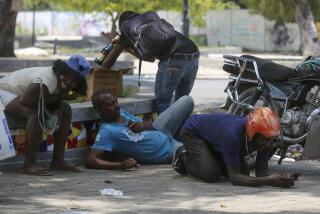Lurching Toward Haiti Invasion : Hoping for the best against all the history
- Share via
It is still not certain the United States will have to use armed force to oust Haiti’s dictators, but it is clear that some form and degree of U.S. military presence are now inevitable, if only to ensure that the transition from military to civilian rule is as peaceful as possible. This necessity is most unfortunate, given the history of U.S. military interventions in the Caribbean, including an occupation of Haiti from 1915 to 1934. That occupation was far more memorable for its length than its accomplishments.
However, a new U.S. effort to bring democracy to a place that has known little in its nearly 200 years as a nation need not be as futile as the earlier intervention. If it is as quick and efficient as President Clinton and other Administration officials promise--and if it enjoys broad international support, now being marshaled--it could lay the foundation for future stability in the Western Hemisphere’s poorest nation. Let’s hope for that, anyway.
Before the nation-building can begin, there is the problem of wresting control of the government from the officials who three years ago ousted Haiti’s first popularly elected president, Jean-Bertrand Aristide. The junta has put civilian puppets in key government posts but the real power rests with the big three--Lt. Gen. Raoul Cedras, the army commander; Brig. Gen. Philippe Biambry, the army chief of staff, and Lt. Col. Michel-Joseph Francois, police chief in Haiti’s capital, Port-au-Prince.
It is these three men who will be the main targets when and if U.S. military forces storm Haiti. Washington, in hopes of not having to turn to warfare to expel the junta, is offering the three safe passage out of the country if they agree to resign. That is why former President Jimmy Carter is leading a high-level delegation to Port-au-Prince this weekend.
Some critics understandably question the morality of allowing the junta’s leaders to simply walk away after they murdered political opponents and brought about an economic devastation that caused thousands of Haitians to flee to the United States as illegal immigrants. It is exceedingly distasteful to think of such thugs living in comfortable exile; however, there is a pragmatic reason for offering them a deal, and that is to avoid further loss of life.
Although the Haitian military has shown itself to be brutally fierce in dealing with the island nation’s own people, it is clearly no match for U.S. military force. The U.S. advantage is so overwhelming, in fact, that the wisest course of action for Washington clearly is not to use force unless it is absolutely necessary. Because once shooting starts it might be impossible to avoid casualties among the civilian population and “friendly fire” casualties among U.S. personnel. This is a lesson that the U.S. military ruefully learned during the invasion of Panama in 1989.
Heavy casualties among Haitian combatants and civilians, either during or after the initial engagements, could make the difficult task of restoring democracy and rebuilding the Haitian economy all the harder. Such a military development could saddle Aristide--and perhaps whoever is elected to succeed him when his term ends in 1996--with the image of having cooperated with a powerful nation viewed not as a liberator but as an aggressor and oppressive occupier.
Such a picture of the United States has lingered long after most of its interventions in Caribbean nations. Americans can only hope that this unhappy history does not repeat itself.
More to Read
Sign up for Essential California
The most important California stories and recommendations in your inbox every morning.
You may occasionally receive promotional content from the Los Angeles Times.













